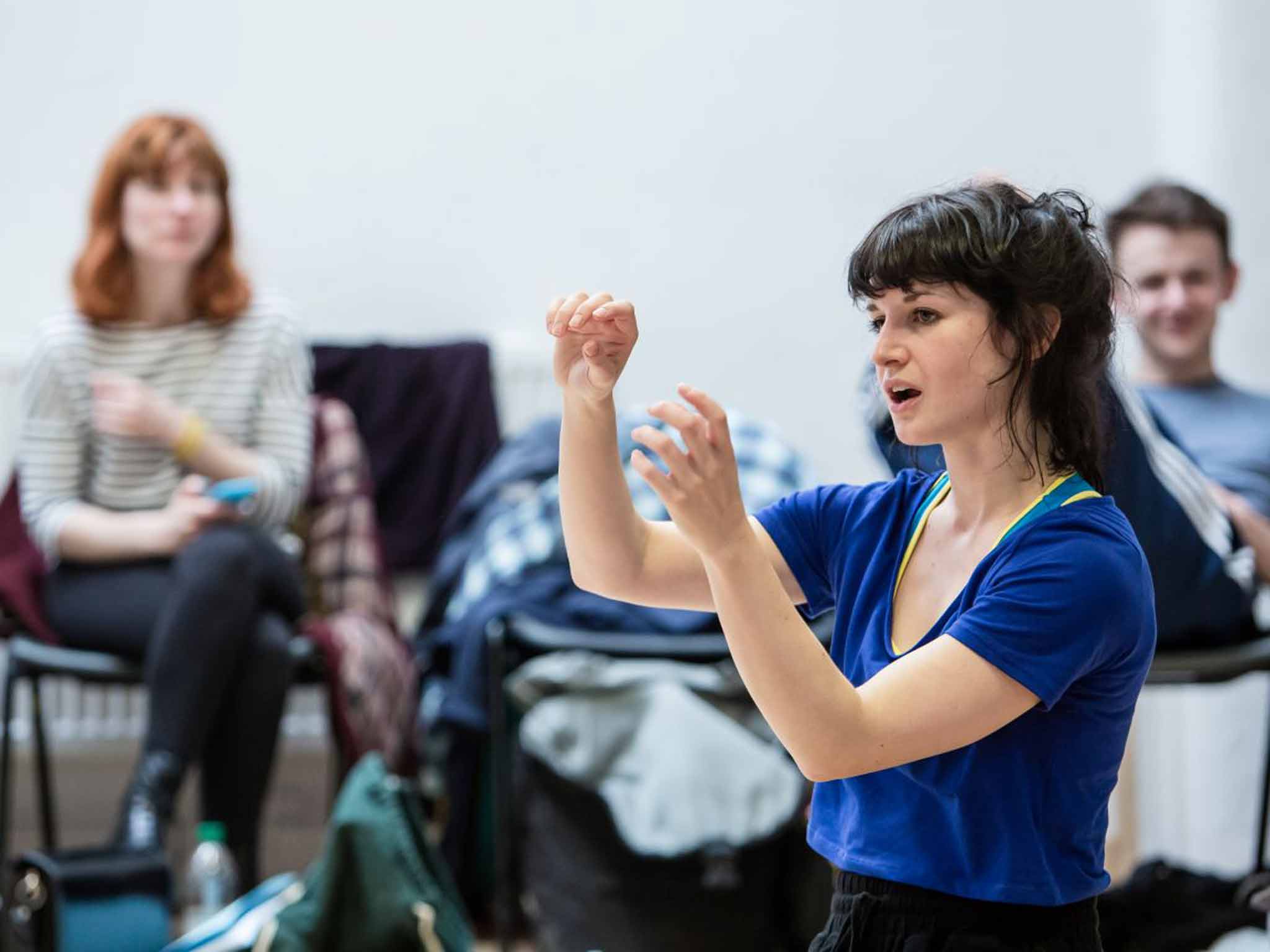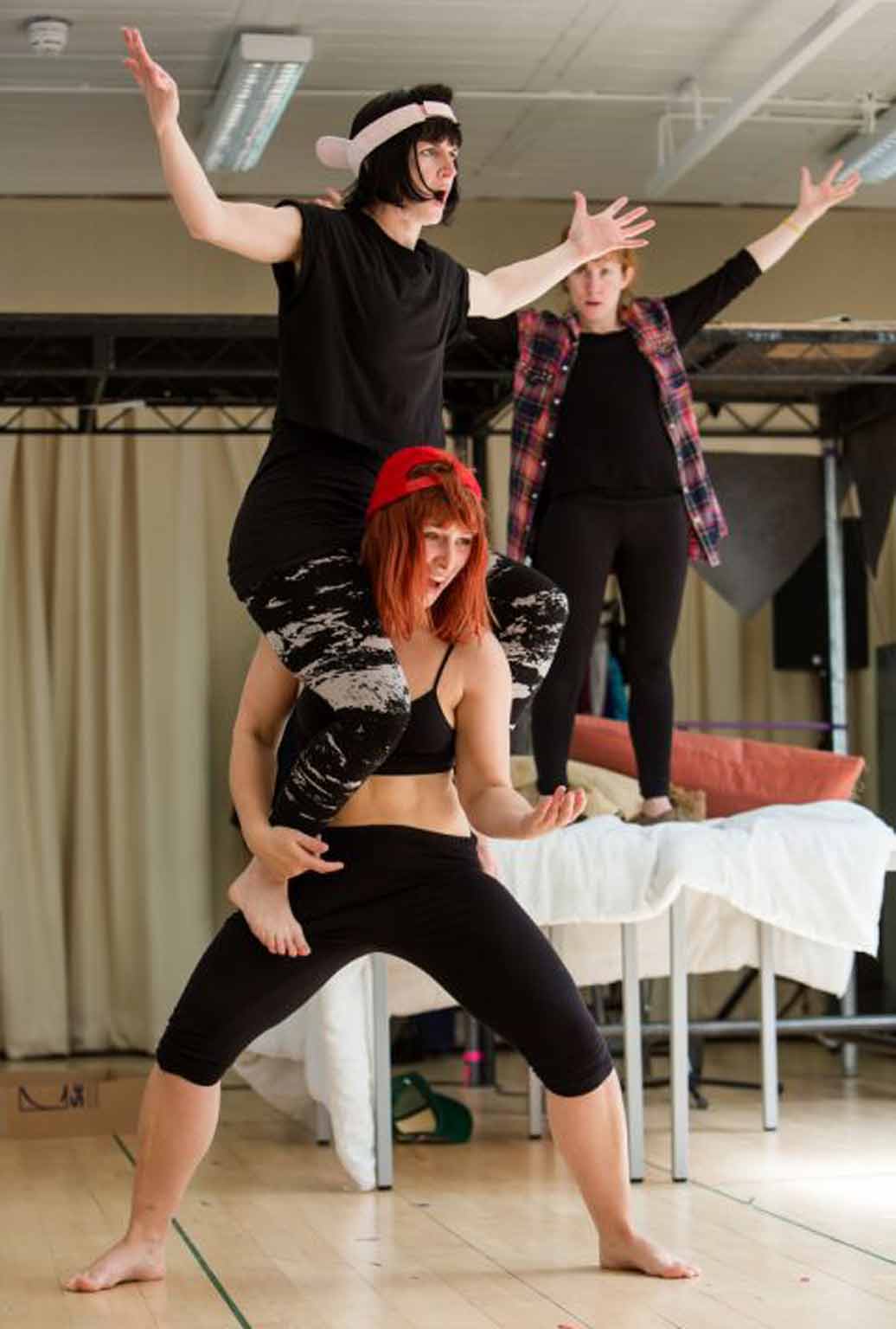The new National Theatre show tackling internet pornography
'We Want You to Watch' - Feminist campaigner Caroline Criado-Perez asks whether the world of online sex can be reclaimed from misogynists and made into art

Your support helps us to tell the story
From reproductive rights to climate change to Big Tech, The Independent is on the ground when the story is developing. Whether it's investigating the financials of Elon Musk's pro-Trump PAC or producing our latest documentary, 'The A Word', which shines a light on the American women fighting for reproductive rights, we know how important it is to parse out the facts from the messaging.
At such a critical moment in US history, we need reporters on the ground. Your donation allows us to keep sending journalists to speak to both sides of the story.
The Independent is trusted by Americans across the entire political spectrum. And unlike many other quality news outlets, we choose not to lock Americans out of our reporting and analysis with paywalls. We believe quality journalism should be available to everyone, paid for by those who can afford it.
Your support makes all the difference."At the end of the day, it's just porn." Pandora Blake shrugs and eats a mouthful of scrambled egg. We're having breakfast in a small café off Tottenham Court Road. Blake, a feminist porn producer and performer, has just finished describing a porn film she came across online that was tagged "brutal ass-banging". From the looks our fellow diners have been giving us, it seems clear that not everyone is as relaxed as she is.
Porn is this year's hot topic. Over the past six months, we've been treated to debates, articles, documentaries, books – and now a play at the National Theatre. We Want You to Watch forms part of a season at the Temporary Theatre that includes plays on zero-hours contracts and the workings of teenage brains – it's young, urgent and political. Conceived through a collaboration between RashDash, a theatre company who have been described as "the punk-princesses of late-night theatre", and Alice Birch, the playwright behind Revolt. She Said. Revolt Again, part of the RSC's Midsummer Mischief season, We Want You to Watch is a harrowing, yet bitingly funny investigation into the effect that internet porn is having on society.
The play is set up as an interrogation – literally: the set foregrounds an interview room against a backdrop of a blown-up image of a woman's face, her eyes grotesquely obscured by open mouths. Cans of "tinned sex" sit in neat rows. We click the identikit porn-spam off the shelf and this two-dimensional woman who sees nothing but must take everything screams – but in pleasure or pain?
The actors are mid-scene as I arrive at the Short Street rehearsal rooms. Peering through the glass window in the door of Studio One, I see a woman in a backwards cap and ratty, mismatched clothes standing on a table. Looking up at her are two more women, both dressed in similarly bright, slightly trashy outfits. The woman on the table is brashly ordering them to dance. To the right is director Caroline Steinbeis, holding a clipboard. A lone man sprawls on the floor.

RashDash are renowned for performances that incorporate movement and music. "I think we'll always choose a subject matter that feels like it needs to be articulated physically," says Abbi Greenland, who along with Helen Goalen founded RashDash, but in this show, the need was particularly acute. "There's a bit in the show where we say what it feels like to watch [extreme porn] and then there's a movement sequence. Because it feels like that's a much more articulate way of saying what it feels like than words."
At the heart of the play are two women who struggle to express what they want and what they hate. They repeat themselves and each other. They interrupt, they desert thoughts half-expressed, sentences trailing off, or exploding in bursts of passion. The script is expressive of inexpressibility. "We're talking about sex," explains Greenland, "[so] we're talking about something that is articulated by bodies and not by words most of the time."
I'm reminded of Greenland's words the next day, as I struggle to put into words what I mean by "extreme porn". Blake pulls me up, pointing out that the BDSM porn she produces, despite its depictions of "negotiation and after-care and affection and tenderness and real relationships", could arguably be considered extreme and is in fact illegal. This is how we get on to the brutal ass-banging. "Most people would see that and think it's misogynistic, it's violent," she says. "But if you actually watch it, the performers are having a great time – they're clearly mates, if not lovers. The guy behind the camera is their mate. Everyone is giggling back and forth, and when at one point she starts squirting all over the floor, they all stop to crack up. And then she's like 'please fuck me in the arse now'."
Blake is right. This is not what I would expect from something positioned as a "brutal ass-banging". But why then, have those words been chosen? It may be further evidence that porn is a form of bodily articulation, and that therefore words will always fall short. But there is another possibility: perhaps the grammar of porn renders it incapable of conveying or even conceiving of intimacy. Perhaps intimacy within porn simply doesn't make sense, because porn is sex with the humanity excised.
RashDash are keen to emphasise that the show is not anti-sex. Rather, "the strong stance on porn is all about making sex better, making our imaginations better", says Greenland. "Sex isn't misogynistic," she points out. "So either the form's wrong or we just haven't found a way of making feminist porn." The show's radical solution to this impasse is to turn off the internet altogether. There may be a "tiny percentage" of the porn that's currently out there that is not overtly misogynistic, explains Goalen, but the play wants us to ask ourselves if it might not "be better just to wipe it all away and see what else we could imagine. To see if we could imagine something that was better and more true to desire."
Blake doesn't think this would be necessary. "I want to create a porn industry that's more varied, more dynamic, that has more healthy depictions of real-world sex and more depictions of intimacy. I want to create a porn that is queerer and has more body diversity. But I don't want to do that by banning the stuff that's already there. Or by telling people they shouldn't make it".
The judgement over what we consider to be an "acceptable" manifestation of desire is necessarily subjective. One man's harmless turn-on is another woman's degrading subjection. For this reason, RashDash do not advocate censorship. "I think as soon as you start censoring some things and not others, it's really tricky," says Greenland. "Somebody gets to police desire – I would worry about who got to be in charge of that decision."
Currently, the Authority for Television on Demand (ATVOD) is in charge of that decision. Myles Jackman, a leading obscenity lawyer, tells me that feminist porn has been hit disproportionately in comparison to "mainstream male fantasy" by ATVOD's enforcement of the legislation. Jackman recently defended Itziar Bilbao Urrutia, who produces female dominatrix porn for the website she runs called the Urban Chick Supremacy Cell (UC-SC). Jackman successfully argued that UC-SC, "partly a feminist treatise, partly an art school project, and partly pornography", was not "TV-like" and therefore did not have to comply. But the central hypocrisy in the legislation remains unchallenged.
In the fight for a world where female sexuality is not constrained by misogyny, censorship does not seem to be the answer feminists are looking for. Censors are no more free of sexist baggage than the rest of us. So for Blake, the answer to the problem is clear: "Buy feminist porn. Production is controlled by market forces: if people aren't buying it, people won't be able to make it." Flood the market with feminism; drown out the sexism, she theorises.
RashDash are unconvinced by this argument. When they were researching the show, they made a deliberate effort to search out feminist porn. "It's easy to find porn that feels violent and damaging and degrading", says Goalen, "but we wanted to find things we didn't feel like that about, because this isn't a simple issue where feminists hate porn and other people don't. There's a wide variety of opinions and some women feel really powerful, strong and empowered by it." But they were disappointed by their search. "I think it's possible for people to brand porn as feminist," concludes Greenland, drily.
And so the search continues. We Want You to Watch doesn't provide us with the answers to these difficult questions. They are aware that turning off the internet is not a practical solution — rather it is meant to be an outlandish provocation to debate. "This is a really major issue," says Goalen, "and we should be having much bigger conversations about it." Instead, it is something that remains unspoken, with, RashDash insisting, most people blissfully unaware of what is available online – of what is becoming the new normal while we all look the other way. RashDash want us to look. They want us to watch. Perhaps it's time we did.
'We Want You to Watch' will run at the Temporary Theatre, London SE1 (020 7452 3000) from 11 June-11 July
Join our commenting forum
Join thought-provoking conversations, follow other Independent readers and see their replies
Comments